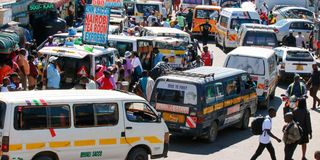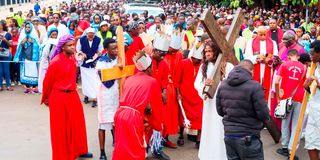Premium
Easter slowdown for some, boom for others: Mixed fortunes in holiday economy

Matatus parked at a Nakuru City bus terminus wait for passengers to various destinations on April 17, 2025.
What you need to know:
- Hotels are reporting lower than usual bookings despite the upcoming Easter festivities.
- Supermarkets across Kenya are offering enticing discounts to help families celebrate Easter affordably.
The Easter holiday, once a peak period for Kenya’s hospitality industry, has seen a notable decline in activity this year as economic hardships continue to weigh heavily on household spending.
Compared to the vibrant festivities and near-full hotel bookings witnessed in 2023 and 2022, the 2025 Easter season has been marked by cautious consumer behaviour, lower travel volumes, and scaled-down celebrations, multiple interviews reveal.
Hotels are reporting lower than usual bookings despite the upcoming Easter festivities, a time that typically sees high tourist activity.
Industry insiders point to a combination of shrinking disposable income, elevated travel costs, and an overall atmosphere of caution among consumers as the primary reasons for the downturn.

Shops along Kimathi Street in Nairobi with low customer turnout during on April 19, 2025 as Kenyans celebrate Easter.
Mr Hillary Siele, the general manager of the Travellers Hotels Group, says that there is a sharp decline in bookings, reflecting the broader economic hardships that have hit the hospitality sector this year.
He says the hotel occupancy levels have dropped significantly compared to last year, prompting the management to take drastic measures to remain operational.
“This year, the numbers are still low compared to last year when we were doing about 90 per cent occupancy. Right now, we are struggling to maintain around 72 per cent. That’s a huge drop, and it’s across the entire field. We are not alone. Everyone is feeling it,” he said.
Mr Siele attributed the downturn largely to the struggling economy, which has forced many potential clients to cut back on travel and leisure spending.
“Most clients haven’t really said why they’re not coming like before, but, it could be about the economy. People are not spending the way they used to. And for us, as hoteliers, the only way to survive right now is to adapt quickly,” he said.
To keep the hotel running, Mr Siele said they have had to slash prices and introduce a variety of promotions. And marketing strategies.
However, Mr Mike Macharia, the CEO of the Kenya Association of Hotel Keepers and Caterers (KAHC), says the country’s hospitality industry is on a strong growth trajectory, cautioning against drawing conclusions from short-term booking patterns such as the Easter weekend in Nairobi.
“Nairobi can never be busy over Easter. That just doesn’t happen. It’s not a new trend. It’s something we’ve seen year in, year out. During such holidays, most locals travel upcountry or to the Coast. So, if someone tells you that Nairobi hotels didn’t record high occupancy during Easter, they’re not telling you anything new or significant,” he said.

Upcountry-bound passengers board matatus along Kenneth Matiba Road on April 18, 2025.
He dismissed suggestions that low bookings in the capital over Easter point to a larger crisis in the sector.
“Easter is just four days in an entire year. The real story should be what’s been happening over the last few months, and what’s forecast for the rest of the year. You cannot base the performance of a whole industry on a single holiday period. That’s not how this works. Occupancy is a matter of fact, not guesswork or assumptions. It’s about real bookings, real numbers, real guests,” he said.
Mr Macharia added that the industry needs to be assessed from a broader perspective.
“People need to stop cherry-picking isolated events. If you’re going to report on performance, ask for data on what hotels did from January to April, not just during one weekend. Then you’ll have a more accurate picture,” he said.
Speaking about the Coast, he acknowledged that some players in Mombasa were using aggressive marketing to fill rooms, but said this is part of a normal business cycle.
“Yes, we’re seeing some promotions and offers at the Coast. That’s to be expected. It doesn’t mean there’s a crisis. It just means businesses are adjusting to demand trends. That’s what hospitality is, it’s seasonal. There are high seasons, low seasons, and average years. What’s important is how the overall year performs, not a knee-jerk reaction to one holiday," he added.
Mr Macharia was upbeat about the future, pointing to record-breaking international arrivals and increased air connectivity as signs of momentum.
“Last year, we crossed the two million mark for the first time ever. That’s a big deal. We had 2.4 million international visitors. That kind of growth doesn’t happen if your industry is in trouble. We’re on the rise,” he said.
“The Ministry of Tourism has been working to push our numbers to five million visitors. That may sound ambitious, but we’re seeing the groundwork already. We have three new international airlines that have started flying into Kenya: one from India, one from Kuala Lumpur, and another doing direct flights from Dubai. On top of that, Turkish Airlines is coming back from June. These are not small developments. They mean more seats, more arrivals, and more business for our hotels,” he added.
Domestic air travel costs have nearly doubled in the lead-up to the Easter festivities, with increased demand pushing some routes close to full capacity by Friday. Kenya Airways (KQ) tickets from Nairobi to Mombasa are going for as high as Sh17,100, while flights from Nairobi to Kisumu are priced at an average of Sh16,300.
However, airfares across all routes are expected to drop on Easter Monday, as demand for local travel significantly decreases.
“It’s just busy like always. We are as busy as always,” said Skyward Express CEO Mohamed Abdi.

Public service buses parked at the Nairobi Bus Station as short-distance travel services experience low passenger turnout on April 19, 2025 during Easter holiday.
Meanwhile, the Madaraka Express has been fully booked for the Easter period. First class tickets are priced at Sh4,500 for adults and Sh2,250 for children, while economy class tickets cost Sh1,500 for adults and Sh750 for children.
At the same time, supermarkets across Kenya are offering enticing discounts to help families celebrate the season affordably.
According to economist Samuel Nyandemo, the financial pressure on Kenyan households has reached a boiling point, with many citizens forced to choose between essentials and previously routine comforts.
He said the country’s economic climate has deteriorated rapidly, driven by what he termed “abnormal” taxation policies and a ballooning cost of living.
“Kenyans have been suffocated by unnecessary, abnormal taxes. The economic activities have shrunk, and the disposable income has been compromised by excessive taxation,” he said.

Catholic faithful in a procession along Parliament Road in Nairobi to commemorate the way of the cross as Christians celebrate Easter on April 18, 2025.
Dr Nyandemo added that the rising cost of living is pushing people to prioritise essentials over leisure, noting that there is growing public discontent with the current administration’s fiscal direction, where high taxes on fuel, food, and basic commodities are being felt across every sector of society.
“Everyone who was once into serious spending has opted to tighten the belts. And remember, schools are about to open. Parents are choosing to take their children to school rather than spending on the Easter holidays,” he said.
He noted that the reality on the ground is that many households are only able to meet basic needs.
“The cost of living is high, meaning that everybody is now… avoiding unnecessary spending. People are not choosing leisure anymore, unless you are part of the elite,” said the senior economics lecturer.
He noted that the harsh times have exposed the emotional strain many Kenyans feel, not just economically but morally, watching those in power seemingly thrive while ordinary citizens struggle to make ends meet.



